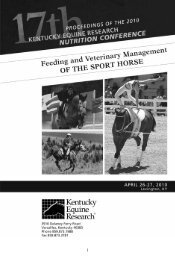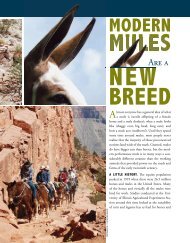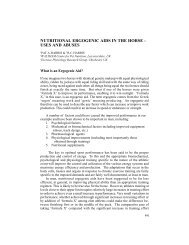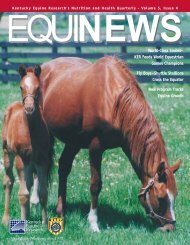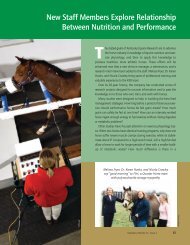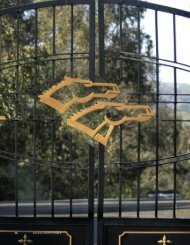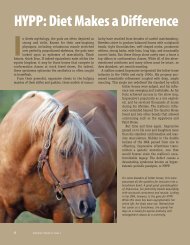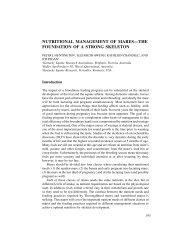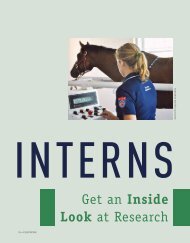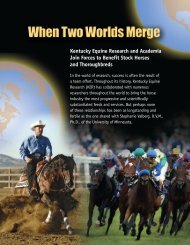The potassium content of barley hay is actually - Kentucky Equine ...
The potassium content of barley hay is actually - Kentucky Equine ...
The potassium content of barley hay is actually - Kentucky Equine ...
You also want an ePaper? Increase the reach of your titles
YUMPU automatically turns print PDFs into web optimized ePapers that Google loves.
Questions & Answers<br />
BY DR. KATHLEEN CRANDELL AND DR. STEPHEN DUREN<br />
QBecause <strong>of</strong> the drought th<strong>is</strong> year, we are already feeding<br />
<strong>hay</strong> to our horses. I am having a very difficult time finding<br />
<strong>hay</strong> to buy. A neighbor <strong>of</strong> mine has some <strong>barley</strong> <strong>hay</strong> he <strong>is</strong><br />
willing to sell us, but I am nervous about feeding something<br />
that I am not familiar with. Are there any problems<br />
with feeding <strong>barley</strong> <strong>hay</strong> to horses I have a few horses with<br />
HYPP. Is there too much <strong>potassium</strong> in <strong>barley</strong> <strong>hay</strong><br />
A<strong>The</strong> National Research Council (NRC) book entitled<br />
Nutrient Requirements <strong>of</strong> Horses l<strong>is</strong>ts an analys<strong>is</strong> <strong>of</strong> <strong>barley</strong><br />
<strong>hay</strong> (see below). It would be best to send a sample <strong>of</strong> the<br />
<strong>hay</strong> to a forage testing laboratory for analys<strong>is</strong> <strong>of</strong> nutrient<br />
<strong>content</strong> before buying it because the values may differ from<br />
those l<strong>is</strong>ted here depending on the quality <strong>of</strong> harvesting.<br />
Barley Hay (DM bas<strong>is</strong>)<br />
Crude Protein..........................................................8.8%<br />
Crude Fat................................................................2.1%<br />
Crude Fiber ...........................................................26.7%<br />
Calcium ................................................................0.24%<br />
Phosphorus ...........................................................0.28%<br />
Magnesium............................................................0.16%<br />
Potassium .............................................................1.47%<br />
Copper.............................................................4.4mg/kg<br />
<strong>The</strong> <strong>potassium</strong> <strong>content</strong> <strong>of</strong> <strong>barley</strong> <strong>hay</strong> <strong>is</strong> <strong>actually</strong> lower<br />
than most <strong>hay</strong>s sampled. Barley <strong>hay</strong> generally has <strong>potassium</strong><br />
levels under 2%. Th<strong>is</strong> would make th<strong>is</strong> <strong>barley</strong> <strong>hay</strong> very<br />
suitable for a HYPP horse. Much <strong>of</strong> the problem that HYPP<br />
horses suffer from comes from their inability to rid excess<br />
<strong>potassium</strong> from the body, so keeping a diet as low in <strong>potassium</strong><br />
as possible will <strong>of</strong>ten help the horse remain<br />
asymptomatic. Feeding a lower <strong>potassium</strong> <strong>hay</strong> and grain<br />
(such as oats) with a vitamin/mineral supplement <strong>is</strong> the<br />
simplest feeding program for a HYPP horse.<br />
In the values l<strong>is</strong>ted above, the calcium to phosphorus<br />
ratio <strong>is</strong> inverted. In other words, there <strong>is</strong> more phosphorus<br />
than calcium (0.24:0.28 = 0.85:1). Horses fed diets with<br />
more phosphorus than calcium can develop a bone d<strong>is</strong>ease<br />
called nutritional secondary hypoparathyroid<strong>is</strong>m, in which<br />
the body takes calcium out <strong>of</strong> the bones leaving them brittle<br />
and deposits it in the form <strong>of</strong> very weak, porous bone<br />
on the bridge <strong>of</strong> the nose and jaw. <strong>The</strong> ideal ratio <strong>of</strong> calcium<br />
to phosphorus in the horse <strong>is</strong> between 1:1 and 2:1.<br />
Th<strong>is</strong> does not mean that you would not be able to feed <strong>barley</strong><br />
<strong>hay</strong>, only that you need to make sure that the rest <strong>of</strong><br />
the diet has plenty <strong>of</strong> calcium. Plain grains such as oats<br />
tend to be low in calcium, so there <strong>is</strong> a potential problem if<br />
they are fed alone with the <strong>hay</strong>. It <strong>is</strong> possible that the particular<br />
<strong>barley</strong> <strong>hay</strong> you are thinking <strong>of</strong> buying may not have<br />
an inverted calcium to phosphorus ratio. Having the <strong>hay</strong><br />
analyzed will determine th<strong>is</strong>.<br />
In France <strong>barley</strong> straw <strong>is</strong> frequently fed as chaff (chopped<br />
straw and molasses). <strong>The</strong> straw <strong>is</strong> supplemented with a high<br />
quality concentrate to compensate for the lack <strong>of</strong> nutrients<br />
in the forage. I have not heard <strong>of</strong> any major problems with<br />
feeding <strong>barley</strong> <strong>hay</strong> and it <strong>is</strong> fairly palatable to the horse. By<br />
looking at the nutrient values given by the NRC, it appears<br />
to be a fairly low quality feed but should work fine as a<br />
source <strong>of</strong> essential fiber for a horse<br />
<strong>The</strong> <strong>potassium</strong> <strong>content</strong> <strong>of</strong><br />
<strong>barley</strong> <strong>hay</strong> <strong>is</strong> <strong>actually</strong> lower<br />
than most <strong>hay</strong>s sampled.<br />
Barley <strong>hay</strong> generally has<br />
<strong>potassium</strong> levels under 2%.<br />
Q<br />
My stabled mare <strong>is</strong> receiving a balanced diet <strong>of</strong> <strong>hay</strong> and<br />
grain, and she has a mineral block in her feeder. She <strong>is</strong> in<br />
training, so I know she <strong>is</strong> getting adequate exerc<strong>is</strong>e.<br />
However, on several occasions I have seen her eating dry<br />
manure. I haven’t noticed any <strong>of</strong> the other horses in the<br />
same barn doing th<strong>is</strong>. Is she lacking a particular substance<br />
in her diet or <strong>is</strong> she just bored<br />
A<br />
Young horses <strong>of</strong>ten eat fresh manure from other horses,<br />
a practice known as coprophagy. It <strong>is</strong> thought the practice<br />
<strong>is</strong> a means for establ<strong>is</strong>hing a normal bacterial population in<br />
the digestive system. <strong>The</strong>refore, a foal eating some manure<br />
<strong>is</strong> not a big problem although it will make you think twice<br />
about letting the foal nuzzle your face. It <strong>is</strong> not common<br />
for mature horses to eat their manure. Several factors could<br />
precipitate th<strong>is</strong> behavior. Horses that are eating a low fiber,<br />
high grain diet or a protein deficient diet may consume<br />
fecal material. An easy dietary adjustment <strong>is</strong> to increase<br />
the amount <strong>of</strong> forage fed and ensure the diet <strong>is</strong> providing<br />
adequate protein. Another factor that may cause horses to<br />
eat manure <strong>is</strong> boredom. Horses that do not get enough<br />
exerc<strong>is</strong>e or horses that have recently had their exerc<strong>is</strong>e<br />
decreased are prone to eating their manure. Providing the<br />
bored horse with turnout or simply less stall time should<br />
help the situation. Finally, it <strong>is</strong> <strong>of</strong>ten thought that horses<br />
who are m<strong>is</strong>sing something in their diet will eat manure.<br />
Th<strong>is</strong> <strong>is</strong> true in the sense that most horses consuming<br />
manure are underfed or in poor condition, but occasionally<br />
horses on a well-balanced diet will pick up th<strong>is</strong> behavior.<br />
<strong>Equine</strong>ws/Volume 3, Issue 1 17
Since th<strong>is</strong> behavior has been detected in your horse only at<br />
th<strong>is</strong> stable, it probably <strong>is</strong> not a glaring nutritional imbalance.<br />
It <strong>is</strong>, however, simple to have your horse’s diet<br />
reviewed by a nutrition<strong>is</strong>t. In the meantime, providing<br />
more forage and more turnout and perhaps providing the<br />
salt in loose form will help the situation.<br />
I have read several <strong>of</strong> your columns about feeding extra<br />
calories in the winter to maintain body weight. Should a<br />
horse’s diet be changed to compensate for hot weather<br />
<strong>The</strong> energy (caloric) intake <strong>of</strong> a horse can be v<strong>is</strong>ually<br />
monitored by watching the weight <strong>of</strong> the horse. If horses<br />
are being fed too many calories (too many groceries) they<br />
will begin to gain weight and eventually become fat. On the<br />
other hand, horses that are not getting enough calories in<br />
the diet will become thin and eventually will not be able to<br />
perform, athletically or reproductively. <strong>The</strong> amount <strong>of</strong> energy<br />
we need to provide a given horse depends upon the size<br />
and activity level <strong>of</strong> the horse. From a caloric standpoint,<br />
activity includes a number <strong>of</strong> demands such as reproduction,<br />
growth, and work (exerc<strong>is</strong>e). Horses should have their<br />
daily energy requirement provided to them regardless <strong>of</strong><br />
whether it <strong>is</strong> summer or winter. In the hot summer months,<br />
recent research has shown it beneficial to provide some <strong>of</strong><br />
the extra calories required by horses as dietary fat. Because<br />
fat (vegetable oil, rice bran, etc.) contains more than twice<br />
A Q<br />
Q<br />
A as many calories per pound as either carbohydrate or pro-<br />
A Q<br />
tein, a horse eating a fat-supplemented diet will need to<br />
eat fewer pounds <strong>of</strong> total feed. Th<strong>is</strong> lower feed intake<br />
results in less heat produced during the digestive process<br />
and less thermal load. All <strong>of</strong> these factors combine to keep<br />
horses cool and happy during the summer.<br />
My neighbor says it <strong>is</strong> a common practice to sort through<br />
<strong>hay</strong> before feeding it to horses in order to check for bl<strong>is</strong>ter<br />
beetles (extremely toxic insects). Do we have anything like<br />
that in the Northwest<br />
To date, bl<strong>is</strong>ter beetle po<strong>is</strong>oning<br />
<strong>is</strong> not a problem for <strong>hay</strong><br />
grown in the Treasure Valley<br />
region <strong>of</strong> Idaho, one reason<br />
<strong>hay</strong> for the 1996 Summer<br />
Olympic Games was purchased<br />
from Idaho <strong>hay</strong> growers.<br />
Bl<strong>is</strong>ter beetles contain a po<strong>is</strong>on (cantharidin) that <strong>is</strong><br />
extremely toxic to horses. Unfortunately, there <strong>is</strong> not a specific<br />
antidote for cantharidin po<strong>is</strong>oning. Ingestion <strong>of</strong> even a<br />
few beetles results in severe colic and, many times, in<br />
death. <strong>The</strong> death <strong>of</strong> horses from bl<strong>is</strong>ter beetle ingestion has<br />
been reported from Florida to Arizona and as far north as<br />
Illino<strong>is</strong>. <strong>The</strong> states known to have the biggest problems<br />
with bl<strong>is</strong>ter beetles are Texas and Oklahoma. To date, bl<strong>is</strong>ter<br />
beetle po<strong>is</strong>oning <strong>is</strong> not a problem for <strong>hay</strong> grown in the<br />
Treasure Valley region <strong>of</strong> Idaho, one reason <strong>hay</strong> for the<br />
1996 Summer Olympic Games was purchased from Idaho<br />
<strong>hay</strong> growers. I agree with your neighbor, however, that<br />
regardless <strong>of</strong> your location or the incidence <strong>of</strong> bl<strong>is</strong>ter beetle<br />
po<strong>is</strong>oning there a quick inspection <strong>of</strong> the <strong>hay</strong> you are providing<br />
to your horse <strong>is</strong> always a good idea. <strong>The</strong>re are many<br />
things that can be baled into <strong>hay</strong> that may not be good for<br />
your horses, including small, dead rodents that can potentially<br />
cause botul<strong>is</strong>m, and aluminum cans that may cause<br />
digestive t<strong>is</strong>sue damage.<br />
My horse always acts like he <strong>is</strong> starving to death and he<br />
<strong>is</strong> a “gobbler” when he eats. I have always been afraid that<br />
he will cause himself to colic. An old horseman suggested<br />
that I put large rocks in my horse’s grain bucket to force<br />
him to eat slowly. Is th<strong>is</strong> guy crazy or will th<strong>is</strong> help<br />
Many horses gobble their feed. Th<strong>is</strong> <strong>is</strong> a condition <strong>of</strong>ten<br />
referred to as bolting their feed. Horses that bolt their feed<br />
run the r<strong>is</strong>k <strong>of</strong> choking. <strong>The</strong> act <strong>of</strong> chewing adds saliva to<br />
the feed, which lubricates it and enables it to be swallowed.<br />
If horses are not chewing their feed properly and adequate<br />
saliva <strong>is</strong> not added, the dry feed material can be lodged in<br />
the esophagus. Occasionally horses can clear the obstruction<br />
from the esophagus, but most will require veterinary<br />
intervention to resolve the problem. Your old horseman<br />
friend has <strong>of</strong>fered a practical solution to your horse’s habit<br />
<strong>of</strong> consuming the grain portion <strong>of</strong> h<strong>is</strong> diet too rapidly.<br />
Simply adding large rocks to the feed bucket will force the<br />
horse to eat more slowly. <strong>The</strong> rocks should be large in size<br />
to prevent the horse from swallowing them. Another solution<br />
may be to <strong>of</strong>fer the horse the <strong>hay</strong> portion <strong>of</strong> its diet<br />
prior to feeding grain. Th<strong>is</strong> will serve to fill the horse’s<br />
stomach prior to the grain being fed. Continuous grazing <strong>is</strong><br />
the natural feeding behavior <strong>of</strong> horses and most horses provided<br />
with that opportunity will be <strong>content</strong> to eat their<br />
feed slowly. Providing continuous access to grass <strong>hay</strong> will<br />
help to sat<strong>is</strong>fy a horse that does not have access to pasture<br />
but the type <strong>of</strong> <strong>hay</strong> fed becomes very important. Free<br />
access to alfalfa <strong>hay</strong> will certainly make the horse happy,<br />
but depending on its activity level (or lack <strong>of</strong> activity) it<br />
may make the horse fat. Feeding smaller amounts <strong>of</strong> high<br />
calorie, dairy quality alfalfa may leave the horse feeling<br />
hungry and encourage bolting.<br />
<strong>Equine</strong>ws/Volume 3, Issue 1 19
<strong>Kentucky</strong><br />
<strong>Equine</strong><br />
Research<br />
I N C O R P O R A T E D<br />
<strong>Kentucky</strong> <strong>Equine</strong> Research<br />
Team Member Directory<br />
Allfarm AG<br />
Ruttimatt 130<br />
Pfeffingen, CH-4148<br />
Switzerland<br />
011-41-61-751-7501<br />
011-41-61-753-9620 FAX<br />
Armada Grain Co.<br />
73180 South Fulton<br />
P.O. Box 918<br />
Armada, MI 48005-0919<br />
810-784-5911<br />
810-784-5918 FAX<br />
Aslin Finch<br />
10424 W. Aero Road<br />
Spokane, WA 99204<br />
800-538-8700<br />
509-455-5635 FAX<br />
Bagdad Roller Mills, Inc.<br />
5740 Elmburg Rd.<br />
P.O. Box 7<br />
Bagdad, KY 40003<br />
502-747-8968<br />
502-747-8960 FAX<br />
Banks Mill<br />
1270 Banks Mill Rd.<br />
Aiken, SC 29803<br />
803-641-0007<br />
803-502-0600 FAX<br />
Bartlett Milling Co.<br />
701 South Center, 28677<br />
P.O. Box 831<br />
Statesville, NC 28687<br />
800-438-6016<br />
704-873-8956 FAX<br />
Brandt’s Mill<br />
630 N. 9th Street<br />
Lebanon, PA 17046<br />
717-272-6781<br />
717-272-7009 FAX<br />
Brooks Feed Store<br />
RR #4<br />
1580 Hwy 7A<br />
Port Perry, ONT L9L 1B5<br />
Canada<br />
905-985-7992<br />
905-985-8297 FAX<br />
Brumfield Hay & Grain<br />
671 Bizzell Dr.<br />
Lexington, KY 40510<br />
606-255-0788<br />
606-254-5722 FAX<br />
Burkmann Feeds<br />
1111 Perryville Road<br />
Danville, KY 40422<br />
606-236-0400<br />
606-236-7307 FAX<br />
Burlington<br />
Consumers Co-op<br />
638 Kane St.<br />
P.O. Box 220<br />
Burlington, WI 53105<br />
414-767-2019<br />
414-767-2026 FAX<br />
Cache Commodities<br />
860 W. 24th St.<br />
Ogden, UT 84402<br />
800-327-3234<br />
801-392-2498 FAX<br />
Culpeper Farmers<br />
Cooperative<br />
15172 Brandy Rd.<br />
P.O. Box 2002<br />
Culpeper, VA 22701<br />
540-825-2200<br />
540-825-2210 FAX<br />
Dodson & Horrell, Ltd.<br />
Spencer Street<br />
Ringstead<br />
Northants NN14 4BX<br />
United Kingdom<br />
011-44-1933-624-221<br />
011-44-1933-625-461 FAX<br />
Farmers Feed Mill<br />
251 W. Loudon Ave.<br />
Lexington, KY 40508<br />
606-255-7602<br />
606-255-9815 FAX<br />
Farmers Warehouse Co.<br />
4367 Jessup Rd.<br />
P.O. Box 160<br />
Keyes, CA 95328-0160<br />
800-400-6377<br />
209-634-6341 FAX<br />
Feed-Rite<br />
17 Speers Road<br />
Winnipeg, MB R2J 1M1<br />
Canada<br />
204-233-8418<br />
204-235-1260 FAX<br />
Fitman a.s.<br />
Helvikovice 90<br />
Zamberk 56401<br />
Czech Republic<br />
011-42-446-27-49<br />
011-42-446-23-57<br />
Flint River Mills<br />
1100 Dothan Rd., 31717<br />
P.O. Box 995<br />
Bainbridge, GA 31718<br />
800-841-8502<br />
800-288-4376 FAX<br />
Hamilton Farm Bureau<br />
4670 East Washington St.<br />
P.O. Box 186<br />
Hamilton, MI 49419<br />
800-442-4137<br />
616-751-7032 FAX<br />
Hubbard Feeds, Inc.<br />
424 N. Riverfront Dr.<br />
Mankato, MN 56002-8500<br />
507-388-9400<br />
507-388-9453 FAX<br />
Hy Gain Feeds PTY. Ltd.<br />
10 Hickson Road<br />
Officer, Victoria 3809<br />
Australia<br />
011-61-03-5943-2255<br />
011-61-03-5943-2258 FAX<br />
Jenco Feeds<br />
47 Warwick St.<br />
Allora, QLD 4362<br />
Australia<br />
011-61-07-4666-3366<br />
011-61-07-4666-3400 FAX<br />
Lakeland Cash Feed<br />
502 Lake Mirror, 33801<br />
P.O. Box 24868<br />
Lakeland, FL 33802-4868<br />
800-682-6144<br />
941-686-9427 FAX<br />
Lakin Milling Co.<br />
4456 S. Dysart Road<br />
Avondale, AZ 85323<br />
623-932-3970<br />
623-932-2798 FAX<br />
LMF Feeds Incorporated<br />
967 Haas Rd.<br />
We<strong>is</strong>er, ID 83672<br />
800-344-0563<br />
208-549-4123 FAX<br />
M. Kelliher & Sons LTD<br />
North Circular Road<br />
Tralee, Co. Kerry<br />
Ireland<br />
011-353-66-21144<br />
011-353-66-21775 FAX<br />
Master Blend Feeds<br />
P.O. Box 24<br />
Old Harbour<br />
St. Catherine, Jamaica, W.I.<br />
876-983-2305<br />
876-983-9241 FAX<br />
NRM NZ<br />
100 Carlton Gore Rd.<br />
4A Private Bag 99927<br />
Newmarket, Auckland<br />
New Zealand<br />
011-64-09-379-1869<br />
011-64-03-300-3185 FAX<br />
Nutribec, Ltee<br />
2950 Rue Ontario Est<br />
Montreal,<br />
QUE H2K-1X3<br />
Canada<br />
514-527-9661<br />
514-527-9452 FAX<br />
Nutrition Services, Inc.<br />
501 Div<strong>is</strong>ion Ave.<br />
York, NE 68467<br />
800-697-1998<br />
402-362-1750 FAX<br />
Otter Co-Op<br />
P.O. Box 4200<br />
3600-248th Street<br />
Aldergrove, BC V4W 2V1<br />
Canada<br />
604-856-2517<br />
604-856-3598 FAX<br />
Pennfield Corp.<br />
711 Rohrerstown Rd.<br />
Lancaster, PA 17603<br />
800-995-0333<br />
717-295-8783 FAX<br />
Pivot Stock Feed Mill<br />
Oaks Road<br />
Carrick Via Launceston<br />
Tasmania<br />
Australia<br />
011-61-03-6393-6655<br />
011-61-03-6393-6771 FAX<br />
O.H. Kruse<br />
5150 Blue Mound Rd.<br />
Fort Worth, TX 76106<br />
817-624-7183<br />
817-624-7281 FAX<br />
Poulin Grain, Inc.<br />
24 Railroad Square<br />
Newport, VT 05855<br />
802-334-6731<br />
802-334-7791 FAX<br />
Premier Feeds<br />
238 Melvin Road<br />
Wilmington, OH 45177<br />
800-888-8162<br />
937-584-4874 FAX<br />
Producer Feeds<br />
165 North Clay Street<br />
Lou<strong>is</strong>ville, KY 40202<br />
800-295-2836<br />
502-568-2293 FAX<br />
Pryde’s Animal Feed<br />
Special<strong>is</strong>ts<br />
Quia Rd.<br />
Gunnedah, NSW 2380<br />
Australia<br />
011-61-02-6742-3966<br />
011-61-02-6742-4423 FAX<br />
SOLLA S.A.<br />
Autop<strong>is</strong>ta Norte km 6<br />
Apartado Aereo<br />
Medellin 1272<br />
Colombia<br />
011-57-4-273-7111<br />
011-57-4-273-6837 FAX<br />
Sunglo Feeds, Inc.<br />
300 N. Main Street<br />
P.O. Box 789<br />
Hesston, KS 67062<br />
316-327-2280<br />
316-327-4949 FAX<br />
Tottenham Feed Services<br />
41 Mill Street<br />
Tottenham, ONT L0G 1W0<br />
Canada<br />
905-936-4163<br />
905-936-2812 FAX<br />
Woodford Feed<br />
498 Lexington Rd.<br />
Versailles, KY 40383<br />
606-873-4811<br />
606-873-5430 FAX<br />
<strong>Kentucky</strong> <strong>Equine</strong> Research,<br />
Inc.<br />
TEAM MEMBER<br />
20 <strong>Equine</strong>ws/ Volume 3, Issue 1



